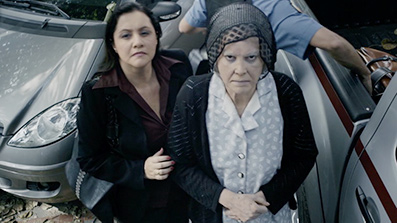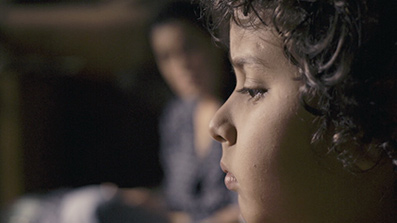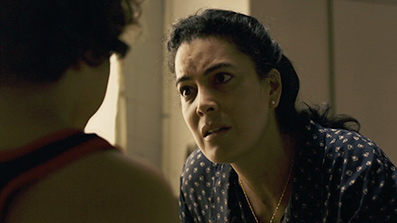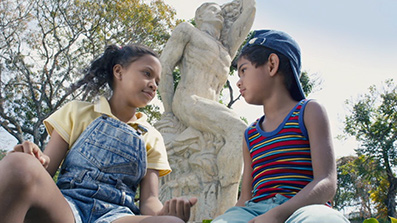| |
"My intention was to make a deep reflection about destiny, to explore whether we human beings could actually change our fate or if it is an unstoppable force, or even if there was some sort of mix between the two paths. For that, I had to work with a universal feeling: a mother's love. I then had to put that feeling within the context and conventions of a language as rigorous and filmic as the genres of suspense and horror. My main effort was to create real characters made of blood and bone, with a soul and humanity, and not merely offer gratuitous frights to the audience." |
| |
Writer-director Alejandro Hidalgo interviewed by Dread Central* |
A woman wakes up on the floor of an old house with a cut on her face and pieces of broken mirror lying all around her. Picking up a large shard of glass to use as a defensive weapon (and holding it in a way that would probably cut her hand to shreds, but we'll let that pass), she makes her way nervously downstairs and into the basement. Here she discovers the body of a man named Juan José with a knife stuck in his neck. As it turns out, he's not quite dead, but after giving the woman a fright (boo!), he quickly expires. She finally finds the person she's been searching for, her young son Leopoldo, who looks on apprehensively from the far side of the room. She encourages him to come forward and promises to take care of him, but after only a couple of tentative steps he's pulled backwards into the gloom with a speed that suggests that The Tall Man from Phantasm has paid the family a visit. A short while later, we learn that the woman's name is Dulce, that Juan José was her husband, and that she has been arrested for killing him and Leopoldo. In no time at all she's been convicted and sentenced to life imprisonment for the crimes.

Thirty years later (yep, that caught me out too), a quirk in Venezuelan law – one that specifically benefits women of Dulce's now advanced years – sees her released from prison and placed instead under 24-hour house arrest with two armed guards at her gate. This, of course, puts her back in the location where the very incident that sent her to jail took place. By then, we're pretty certain she was wrongly convicted, and she's not been there long before she's visited by a young parish priest who just can't believe that she could have committed these heinous acts. Although her time in prison has seen Dulce dispense with God, the priest gains her trust enough for her to tell him what took place on that fateful night. Despite the fact that her fingerprints were found on the knife, she swears she didn't touch it. "The house did it," she tells him. "The Intruders. They killed my husband and took away my child." As Dulce recalls the events that led up to her husband's murder in extended flashback, and the priest turns detective and looks into the dark history of the house in which Dulce is now imprisoned.
What unfolds is a blend of intriguing family drama and seemingly familiar horror movie tropes. Impressively handled though the latter may be, there's little here that genre fans won't have seen a number of times before, as locked doors are forcefully rattled, mysterious figures make sudden appearances in frame, Dulce twice backs into figures behind her, and an arm reaches through an open doorway to grab her exposed face. The family drama, on the other hand, is quietly affecting, from the tension that has grown from the dying embers of Dulce and Juan José's marriage to the bond between Leopoldo and his younger brother Rodrigo, one that becomes dangerously strained when Rodrigo falls for local girl Saraí. It's when these two genres collide that things get really interesting, notably when Leopoldo reveals that he was visited by a female apparition, who told him that he should not play with Rodrigo and gave him a potentially sinister note for his mother.

It's Leopoldo's disregard of the instruction passed to him by this unseen visitor, a move selfishly triggered by his jealously of Rodrigo's new relationship with Saraí, that has consequences that push the film towards its final act. And it's here that everything changes, as the elderly Dulce waits alone to discover what the house will unleash on a very specific time and date. It's also here that writer-director Alejandro Hidalgo really shows what he is made of, as he cross-cuts between timelines in a thrillingly mind-bending (but never confusing) series of temporal loops, making good on his title and giving new meaning to all of those elements that we earlier might have dismissed as old hat. It's as smart and satisfying a climax as I've seen in a genre film in some considerable time, one that prompts a rethink of just about everything that has gone before, and takes care to guide you through the process of comprehension without ever feeling like a patronising idiots' guide.
But what really caught me out is that where most genre movies would use this climax to go all out and scare or bamboozle its audience, writer-director Alejandro Hidalgo stays true to his commitment to the family drama to deliver a whole string of unexpected emotional body blows. And we're not talking manufactured sentimentality here, but a moving exploration of loss and regret, of the bonds of family, of the strength of a mother's love, and of what we might learn from our past mistakes. It came as no surprise to me to find a discussion thread on IMDb in which viewers admitted to shedding a tear or two at some of these scenes.
Much of why this proves so affecting is down to the conviction of the performances from a carefully chosen cast. Ruddy Rodríguez is quietly superb as Dulce, both as the weary and increasingly terrified mother and the tired and bitter woman that she later becomes. There are occasions when the old age makeup proves just transparent enough to reveal the younger actress beneath, but on the whole it convinces, and Rodríguez's way with facial expression and almost arthritic body language are absolutely on the nose. But the real find here has to be young Rosmel Bustamante, who comes close to stealing the film as Leopoldo, required as he is to run the full emotional gamut, from excitement to jealously to wide-eyed terror to heart-rending regret, every one of which he nails with the authenticity of a 30-year veteran.

It's been claimed that The House at the End of Time is Venezuela's first horror-thriller (it was also the highest grossing thriller in the country's history), and if so then genre filmmaking there is off to a belter of a start. It's also writer-director Hidalgo's debut feature, and on the basis of this I'd be damned surprised if we didn't hear again from him soon, though hopefully not helming an overblown and unnecessary Hollywood remake. Yes, the first half may require a little patience on your part, especially if you know your haunted house horrors, but stick with it and the reason for the use of some of these well-worn motifs will later make sense, as they are revealed not to be the random picks from the cinematic scare bucket that they initially seem to be. And extraordinary though it may seem, the film packs an even bigger punch the in the second viewing, when the purpose of all of those elements that felt a little like dramatic soft pedalling the first time around becomes abundantly clear. It's here that I fully appreciated the scope and layered complexity of Hidalgo's achievement, and realised that in spite of what an unprepared first viewing tends to suggest, there's not a moment anywhere here that is not part of the film's intricately devised and executed tapestry. As yes, I'd say Hidalgo makes good on that top-quoted intention. And then some.
A generally crisp 1.78:1 anamorphic transfer whose contrast varies a little in the opening scene, sometimes on a shot-to-shot basis, but settles down and hits the black levels nicely once the main story gets going and copes well with the fact that a good part of the film takes place in the dark. Colour is terrific on daytime exteriors, and although has been subject to post-production tinting and grading in the night-time interiors, these have been cleanly captured. As you would expect from a modern transfer, there are no dust spots or traces of damage.

The choice between Dolby 2.0 stereo and Dolby 5.1 surround is an easy one to make: clear and lively though the stereo track is, the thumping bass kick of the 5.1 and the sometimes unsettling use of the surrounds make it a clear winner. The directional separation is showcased to best effect in a sequence in which the younger Dulce visits a blind clairvoyant and is asked to close her eyes, an action the film emulates by blackening the screen and scattering the sounds of unidentified activity around the room.
The English subtitles are clear but fixed.
All we have here is a smartly assembled Theatrical Trailer (2:19). A shame, as I'd certainly have liked to know more about the film's first-time writer-director.
At the risk of building your hopes up too high, for my money The House at the End of Time is one of the most intelligently devised and involving genre films I've watched so far this year. With horror cinema still stuck in a seemingly endless loop of recycling and limp remakes, any work as thoughtful, original and moving as this one deserves to more widely seen and appreciated than it probably will be. A generally solid transfer and a damned fine surround track does help take the sting off the lack of extra feature on this Matchbox DVD, and for the film itself it comes enthusiastically recommended.
* http://www.dreadcentral.com/news/72625/screamfest-l-2014-filmmaker-alejandro-hidalgo-talks-us-premiere-house-end-time/
|